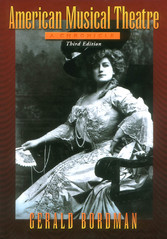
American Musical Theater: A Chronicle

von: Gerald Bordman
Oxford University Press, 2001
ISBN: 9780195130744
Sprache: Englisch
936 Seiten, Download: 95327 KB
Format: PDF, auch als Online-Lesen
9 INTERMISSION BROADWAY'S RESPONSE TO THE SWING ERA, 1937-1942 (p. 555)
By the summer of 1937 the swing era was at its peak. The jazz era, which had reigned through the gay, gaudy years of the twenties and, with a subdued, modified tone, continued through the somber years of the early thirties, had drifted incontestably into history. George Gershwin's death on II July 1937 underscored its passing. In theatrical terms, Gershwin had been the most articulate and memorable of the modernists, the personification of his high-kicking epoch.
No similar figure emerged to give comparable theatrical definition to swing. To some extent this was predictable, because swing, as has been noted, was a less theatrical musical idiom than jazz or ragtime had been, and because, as an expression of popular musical speech, it was more likely to be appropriated by and developed in Hollywood than on a stage catering to an increasingly older audience. Unfortunately Broadway's most gifted melodists, men such as Richard Rodgers, Irving Berlin, and Cole Porter, while complaining about the harsh treatment their songs received at the hands of swing arrangers, actually abetted the trend toward exaggeratedly rhythmic presentation by falling into creative slumps during this period. Good songs were fewer, songs that proved lastingly popular, fewer still.
National and international turmoil— the persistent Depression, the Nazi terror, the onset of World War II—undoubtedly had a debilitating influence. Librettists as well as composers were affected. Books became trite, satire less bitingly satiric, romance less flamboyantly romantic. Only toward the end of this five-year lull did two daringly pioneering works present genuine possibilities. Yet, as it turned out, neither pointed precisely in the direction that ultimately led the American Musical Theatre out of its doldrums.
1937-1938
This intermission opened with an eerie, uncomfortable season. The Depression, which had seemed to be lifting, suddenly took a turn for the worse, and the number of shows produced on Broadway fell to the lowest figure in thirty years. Almost defiantly, the number of new musicals rose slightly. Yet even here a feeling of uneasy change prevailed. Productions came from unaccustomed sources. The WPA Federal Theatre Project mounted several. The Mercury Theatre, a repertory company heretofore devoted to the classics, helped stage one of the most controversial, and a labor union offered what became the long-run hit of the year. These organizations naturally influenced the tenor of the pieces.
Social and political outlook became as important as entertainment value. Harsh, provocative words claimed priority over sweet, singable melodies. A malaise affected even the more conventional commercial productions. There were few outstanding songs, and most of those were subdued ballads. Lyricists and librettists fared a bit better, but two of the biggest hits of the season, for all their success, represented unhappy matings of stars and authors.
The Federal Theatre Project opened the season in the middle of summer with a black musical comedy, Swing It (22 July 1937, Adelphi). Its story line followed the down-at-the-heels crew and entertainers of a rickety Mississippi showboat in their effort to find a better lot in Harlem. The show was really "a potpourri of minstrelsy, singing, dancing, mugging, clowning, spirituals, jazz, swing, tapping and the carrying of Harlem's throaty torch." Henry Jines and James Green sparked the comedy, playing two characters with Tweedledum-Tweedledee names, Rusty and Dusty. Herbie Brown's dancing waiter served up flashy tap routines between courses. Romantic interests, so carefully muted in early Negro shows, crept in, allowing Sherman Dickson and Frances Everett to smooth their path to the altar with "Ain't We Got Love."







